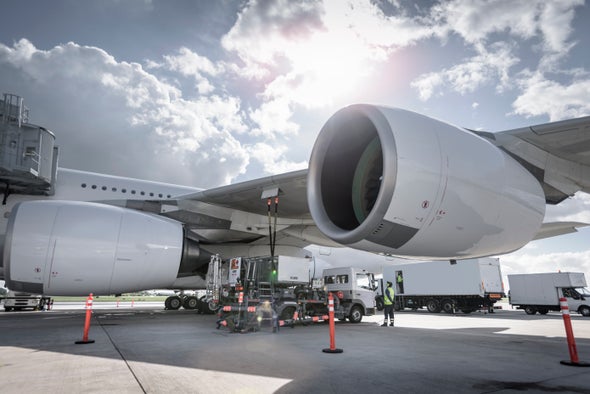Production of cleaner jet fuel is showing signs of a boom in the United States and around the world, propelling what could be the best tool for reducing aviation emissions in the short term.
Airlines are committing to buying millions of gallons of so-called sustainable aviation fuel (SAF) to meet their net-zero goals, and producers are expanding their capacity significantly. That’s setting the stage for exponential growth within the next decade, according to industry officials.
Global production of the cleaner fuel reached at least 80 million gallons in 2022—an increase of 200 percent over 2021 levels, according to estimates—putting the biofuels industry on track to reach an expected “tipping point” of roughly 8 billion gallons produced annually by 2030, said the International Air Transport Association (IATA).
“I see all the pieces coming together at a far more rapid rate than at any other point in my career,” said Michael McAdams, president of the Advanced Biofuels Association. “SAF is the pretty girl at this dance on low-carbon fuels, and I see lots of momentum now.”
The projected growth is not nearly enough to meet global demand—SAF consumption reached 60 billion gallons last year—but the ramp-up is seen as an important step for the aviation industry, which is facing increasing pressure to decarbonize.
Cleaner jet fuel, made of renewable resources such as agricultural waste, is more expensive than traditional jet fuel, but advocates say it can reduce aviation emissions by up to 80 percent. Until electricity can power airplanes at scale, it could be a pillar in the effort to slash airplane emissions that account for 3 percent of all carbon dioxide released into the atmosphere.
IATA, which represents about 300 airlines, estimates that the cleaner fuel will account for about 65 percent of the carbon reductions needed to achieve net-zero emissions within the aviation industry by midcentury, a goal that more than 190 countries agreed to in October.
“There is a huge hill to climb to get to net zero in aviation,” said Scott Lewis, president of World Energy LLC, the first commercial-scale SAF producer in North America. “That’s why we have to start now. We have to use all the technologies that we can, we need to have developers of new technologies out there working like crazy.”
Industry leaders attribute the increase in production to a combination of factors, including technological innovations, larger investments in production facilities, more commitments from airlines and stronger backing from governments, including the Biden administration.
President Joe Biden has pushed for greater uptake of the cleaner fuel as part of his climate agenda. The administration launched the “SAF Grand Challenge” last year to stimulate interagency cooperation and investment with the goal of scaling domestic SAF production up to 3 billion gallons per year in 2030.
The Inflation Reduction Act, which Biden signed in August, includes tax credits for SAF production over the next five years that industry officials say will help lower costs while boosting demand (Climatewire, Aug.12).
Airlines, facing criticism for relying on carbon offsets in their efforts to go green, are increasingly committing to using cleaner fuels instead. Airlines have announced about 40 purchasing agreements with SAF producers so far this year, according to IATA.
JetBlue Airways Corp. said last week that it is shifting its net-zero strategy away from carbon offsets and toward a “science-based” approach that prioritizes using cleaner fuels. Delta Air Lines Inc. has committed to replacing 10 percent of its jet fuel with SAF by 2030. UPS wants to power nearly one-third of its plane fleet with SAF by 2035.
World Energy is spending $4 billion to increase its annual production to 500 million gallons by 2026 and 1 billion gallons by 2030. LanzaJet Inc., another American producer, says it will be able to sell 1 billion gallons a year by 2030. And Neste Oyj, a Finnish company, plans to scale up to 495 million gallons a year by the end of 2023.
Despite its growth, the production industry needs stronger policy support and greater investment to meet its ambitious decarbonization targets, according to a recent report from the Rhodium Group, a research firm.
Airline commitments announced so far are “not yet sufficient enough to really boost production of SAF” at the levels that are needed to clean up aviation, said Eric O’Rear, a senior analyst at the Rhodium Group. “As we’re able to invest more in SAF production pathways, the sooner we’ll be able to kind of see these pathways meet some type of commercial scale.”
Investments in research and development can help accelerate that shift by driving down production costs, which in turn could attract more money for supply chain development and new facilities. That could make the price of SAF more competitiveness with conventional jet fuel, according to the report.
McAdams, of the Advanced Biofuels Association, said the tax credits in the Inflation Reduction Act will help increase production, but he lamented their five-year sunset, saying more time is needed to attract capital for bigger production facilities.
The Rhodium Group said additional government policies could “de-risk” SAF plant investments, require consumption mandates for airlines and lead to research advances through public-private partnerships.
“We can’t be too optimistic, it’s a challenging road,” said Lewis of World Energy. “People have to link arms in this to really create the industry at the scale that it needs to be in order to make a difference.”
Reprinted from E&E News with permission from POLITICO, LLC. Copyright 2022. E&E News provides essential news for energy and environment professionals.


